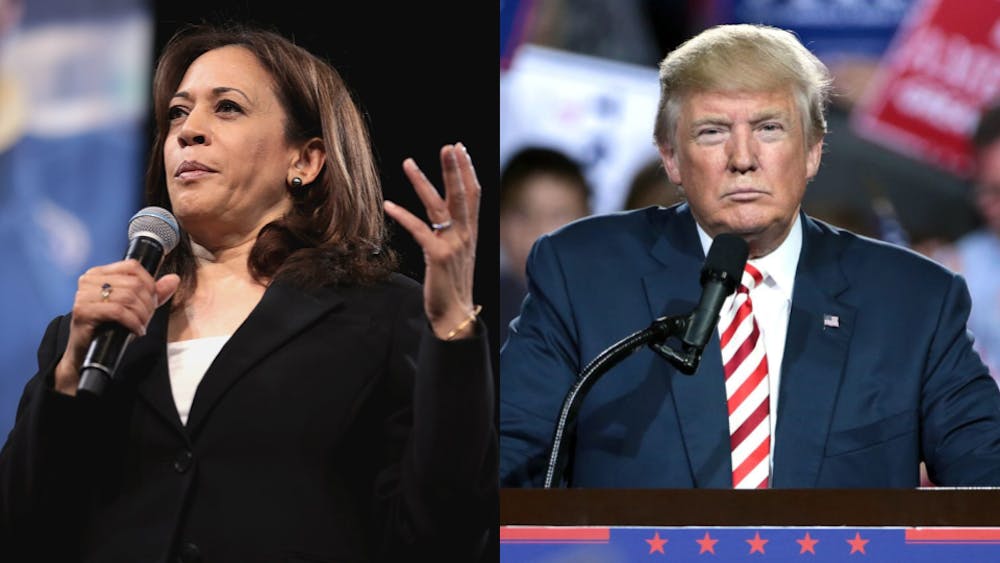Early ratings indicate around 67 million Americans tuned into Tuesday’s presidential debate between Vice President Kamala Harris and Former President Donald Trump.
The Herald reached out to 30 professors from over 10 disciplines to hear their perspectives on the debate. Five shared their key takeaways.
Four professors say Harris won
Four out of five professors agreed that Harris was the debate’s winner. Harris won “hands down,” wrote Prudence Carter, professor of sociology and director of the Center for the Study of Race & Ethnicity, in an email to The Herald.
Carter described Harris as an empathetic and powerful speaker. “At times, I had visceral reactions to (Harris’s) words, how she spoke to the camera and those of us watching,” she wrote.
Senior lecturer in economics Alex Poterack wrote that Harris seemed to successfully “goad” Trump into going on “ridiculous tangents.”
But for Katherine Tate, a professor of political science, the debate won’t change the opinions of potential voters. “For sure Trump did not beat Harris, but Harris didn’t score major points over Trump,” she wrote.
She added that Trump gave a strong performance.
Policy-focused approach versus hostile tactics
Several professors described Trump’s rhetoric as hostile and focused on personal attacks. They characterized Harris as more policy-focused.
“Harris at times appeared to be the only adult in the room,” Tate wrote.
Carter wrote that her primary impression of Trump was that he lacked clear policy visions. She believes Trump targeted an extreme right audience, whereas Harris tailored her performance to appeal to a broader segment of the electorate.
“Voters will go away with Trump being a known quantity, and Harris as someone who is more moderate than expected,” Tate wrote.
Race and gender dynamics at play
Carter felt that racial and gender dynamics were palpable at the debate — especially during the discussions of reproductive healthcare access and Trump’s comments on Harris’ race.
She added that Trump’s attempt to undermine Harris’ identity as a Black woman was “just plain old insulting.”
When discussing immigration, Trump “repeated the lie that migrants to the U.S. were killing and eating other people’s pets,” Tate wrote. According to the debate moderators, that statement, previously debunked by authorities, amplified falsehoods about Haitian immigrants in Springfield, Ohio.
Amy Nunn, professor of behavioral and social sciences, felt “alarmed that we have a presidential candidate who openly throws around racial epithets,” she wrote to The Herald.
Economic and reproductive healthcare policies take the spotlight
Poterack believed that Harris’ focus on expanding the housing supply was promising. “Housing is definitely one of the most important issues the American economy is facing,” he wrote.
Both Poterack and Aparajita Majumdar, an assistant professor of history and environment and society, supported Harris’ plan to expand the Child Tax Credit.
Majumdar wrote that the plan shows “how governments can meaningfully invest in child care support.”
Throughout the debate, Trump discussed raising tariffs on all imported goods.
Poterack believes that across-the-board tariffs would harm domestic consumers, claiming they could lead to higher prices and a lower standard of living. Poterack offered a metaphor to illustrate his view of Trump’s policy.
“If you asked me what is the most important part of baking a cake, I might think about the quality of ingredients you’re going to use, or how well you’d mix the batter,” he explained. “But if I thought you were likely to pour a box of rat poison into the cake, I would say that by far the most important thing is to not pour a box of rat poison into the cake.”
“Donald Trump’s across the board tariff plan is like pouring a box of rat poison in the cake,” Poterack wrote.
Nunn, who is the executive director of Open Door Health, a clinic focused on LGBTQ+ health, wrote that the candidates’ focus on reproductive rights reflects the fact that abortion has “become increasingly more political over time.”
“Many women and people with vaginas are highly concerned about potential restrictions to reproductive health services,” she added.
Some professors also highlighted what the candidates didn’t discuss during the 105-minute debate.
Nunn is concerned about reimbursement rates for primary care. She fears that low reimbursement rates are “prompting an exodus of providers from the field, which is a public health crisis.”
Climate and energy themes received limited attention from the candidates, which indicates those issues are “unfortunately” not a priority, Majumdar wrote.

Kate Butts is a senior staff writer covering University Hall. Outside of The Herald, she loves running, board games and Trader Joe's snacks.

Ciara Meyer is a section editor from Saratoga Springs, New York. She plans on concentrating in Statistics and English Nonfiction. In her free time, she loves scrapbooking and building lego flowers.





